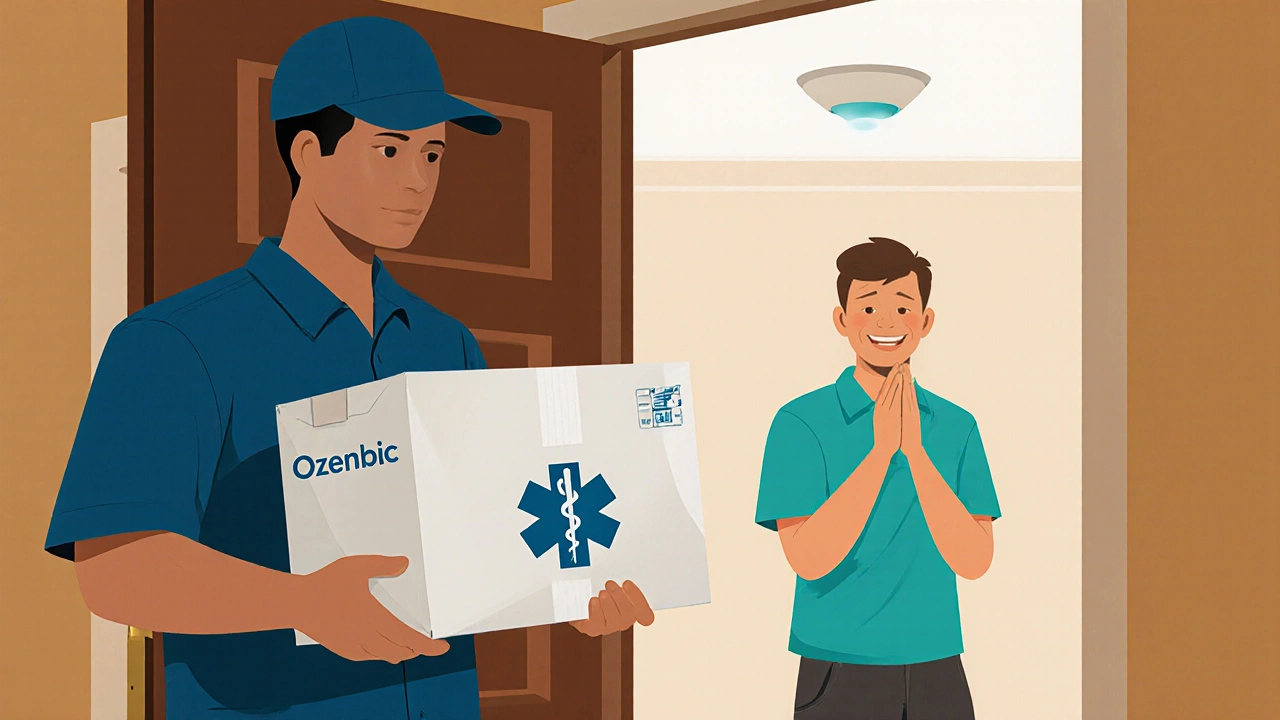How to Qualify for Ozempic: What to Say to Your Doctor
 Oct, 25 2025
Oct, 25 2025
Ozempic Eligibility Calculator
Your Health Information
How to Prepare for Your Appointment
Recommended Conversation Points
- Share your A1C and BMI results
- Mention any weight-loss attempts you've made
- Discuss how Ozempic could help with both diabetes management and weight loss
- Ask about potential side effects and safety considerations
Result:
Please enter your health information to check eligibility.
If you’re eyeing Ozempic is a once‑weekly injectable medication marketed for type 2 diabetes and chronic weight management. It contains the active ingredient semaglutide and belongs to the class of GLP‑1 receptor agonists. Getting a prescription isn’t just about asking for the brand name - you need to meet specific medical criteria and convey the right information during your consult.
Why Ozempic Matters
Clinical trials show that Ozempic can lower A1C by up to 1.8 % and help users lose 10‑15 % of their body weight when combined with diet and exercise. Those results have made it a popular choice not only for managing Type 2 Diabetes but also for patients whose primary goal is sustained weight loss.
Medical Criteria You Must Meet
Doctors follow a handful of eligibility rules before they feel comfortable writing Ozempic. The most common ones include:
- Age ≥ 18 years.
- Diagnosed Body Mass Index (BMI) of 27 kg/m² or higher if you have a weight‑related condition, or 30 kg/m² or higher without comorbidities.
- Confirmed diagnosis of type 2 diabetes (or pre‑diabetes if your doctor deems it appropriate for weight‑loss therapy).
- No personal history of medullary thyroid carcinoma or multiple endocrine neoplasia syndrome type 2.
- Stable cardiovascular status - recent heart attack or stroke within the past 3 months usually disqualifies you.
- Kidney function with eGFR ≥ 30 mL/min/1.73 m²; severe renal impairment often requires dose adjustments or alternative therapy.
These points are drawn from the FDA label and UK NICE guidelines as of 2025.
How to Describe Your Health History
When you book an appointment, be ready to share the following data points. Having them written down helps you stay concise and ensures you don’t forget anything important.
- Current medications. List all drugs, including over‑the‑counter supplements.
- Recent lab results. Bring the latest A1C, fasting glucose, lipid panel, and kidney function tests.
- Weight‑loss attempts. Mention diets, exercise programs, or other prescription meds you’ve tried.
- Comorbid conditions. Note hypertension, sleep apnea, or any cardiovascular disease you’ve been diagnosed with.
- Family history. Highlight relatives with thyroid cancer or pancreatitis, as these affect eligibility.
Doctors often appreciate a clear, factual summary. It shows you’re engaged and reduces the back‑and‑forth during the consult.
Sample Scripts for Your Consultation
Below are three short scripts you can adapt. Feel free to tweak the wording to match your comfort level.
- Basic request: “I’ve been managing my type 2 diabetes with metformin, but my recent A1C is 8.5 %. I read about Ozempic’s ability to lower glucose and support weight loss. Could we discuss whether I meet the criteria?”
- Weight‑loss focus: “I’m 34, BMI 32, and have tried several diets without lasting results. I’m interested in GLP‑1 options like Ozempic that can help me lose weight safely. What do you think?”
- Insurance/online pharmacy angle: “My health plan covers GLP‑1 drugs if I meet certain clinical thresholds. I’ve prepared my labs and would like to know if I qualify for an Ozempic prescription that can be filled through an online pharmacy.”
Notice how each script includes a concrete data point (A1C, BMI, insurance) and a clear request. That’s the kind of language that nudges the conversation toward a prescription.
Common Pitfalls and How to Avoid Them
Even if you meet the medical criteria, some non‑clinical factors can stall your request.
- Missing lab results. If you haven’t had a recent A1C, the doctor may order one before deciding.
- Unclear medication history. Forgetting to mention a prior GLP‑1 trial can raise safety concerns.
- Over‑emphasizing brand name. Asking directly for "Ozempic" without explaining why can make the clinician feel you’re pushing a commercial product.
- Skipping lifestyle discussion. Doctors expect you to be committed to diet and exercise alongside medication.
Address each of these ahead of time, and you’ll reduce the chance of a denied prescription.
Checklist Before You Call the Pharmacy
Once you have a prescription, an online pharmacy can deliver Ozempic directly to your door. Use the quick checklist below to make the process smooth.
| Item | What to Verify |
|---|---|
| Prescription details | Doctor’s name, dosage, quantity, and refills. |
| Pharmacy credentials | Valid UK registration number (e.g., GPhC). |
| Insurance coverage | Check if your plan reimburses GLP‑1 drugs. |
| Delivery options | Standard vs. express, cold‑chain handling. |
| Safety information | Read the IFU (Instructions for Use) and side‑effect guide. |
Having these items ready means the pharmacy can verify your eligibility quickly, and you’ll get your medication without unnecessary delays.
What About the NHS?
The NHS does not routinely fund Ozempic for pure weight‑loss indications. However, if you have type 2 diabetes with an A1C ≥ 7.5 % or a BMI ≥ 35 kg/m² with comorbidities, you may qualify for a publicly funded prescription. Bring the relevant clinical notes and ask your GP to submit a _patient‑specific_ request.

Side Effects You Should Know
Every medication carries risks. The most common Ozempic adverse events include nausea, vomiting, and occasional diarrhea. Rare but serious concerns involve pancreatitis, gallbladder disease, and possible thyroid C‑cell tumors (observed only in rodent studies). If you have a history of Cardiovascular disease, discuss the risk‑benefit balance, especially since trials showed a modest reduction in major adverse cardiovascular events.
When Renal Impairment Affects Eligibility
Patients with an eGFR below 30 mL/min/1.73 m² are generally advised against starting Ozempic. If you fall into this category, your doctor may suggest a lower‑dose GLP‑1 option or an alternative class altogether.
Summary of the Ozempic qualification Process
In short, gather your health data, understand the clinical thresholds, speak the doctor’s language, and be ready to navigate the online pharmacy landscape. When you check each box, you move from curiosity to a legitimate prescription that can help you control diabetes and shed unwanted pounds.
Do I need to have type 2 diabetes to get Ozembic?
No. In the UK, Ozempic can be prescribed for weight‑loss in people with a BMI ≥ 35 kg/m² plus a weight‑related condition, even if they don’t have diabetes. However, the NHS usually funds it only for diabetic patients.
What lab results should I bring?
Bring the latest A1C, fasting glucose, lipid profile, and kidney function (eGFR). Having a recent BMI measurement also speeds up the eligibility check.
Can I get Ozempic from an online pharmacy without a doctor?
No. UK regulations require a valid prescription from a licensed prescriber before any pharmacy-online or brick‑and‑mortar-can dispense Ozempic.
What if I have a thyroid condition?
A personal or family history of medullary thyroid carcinoma (MTC) or multiple endocrine neoplasia type 2 (MEN 2) is a contraindication. Discuss alternatives with your doctor.
How long does it take to see results?
Most patients notice blood‑sugar improvements within 2‑4 weeks and weight loss of 5‑10 % after 3‑6 months when combined with lifestyle changes.